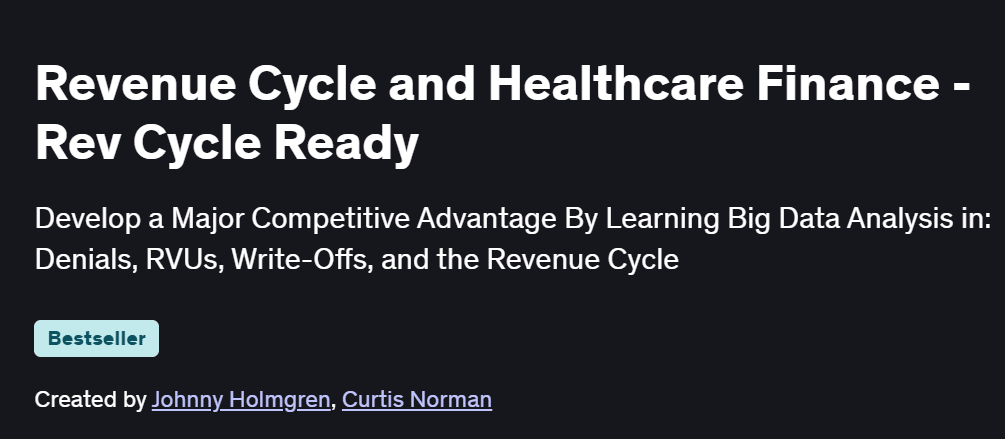What will you in Revenue Cycle and Healthcare Finance – Rev Cycle Ready Course
Understand the fundamentals of healthcare revenue cycle management.
Learn about key performance indicators like Denials, RVUs, and Write-Offs.
Analyze big data in healthcare finance for improved decision-making.
Develop strategies to optimize revenue cycle processes.
Enhance your competitive advantage in the healthcare finance sector.
Program Overview
Module 1: Introduction to Healthcare Revenue Cycle Management
⏳ 30 minutes
Overview of the revenue cycle in healthcare.
Importance of efficient revenue cycle management.
Key components and stakeholders involved.
Module 2: Key Performance Indicators (KPIs) in Healthcare Finance
⏳ 45 minutes
Understanding Denials and their impact.
Exploring Relative Value Units (RVUs) and their significance.
Managing Write-Offs and their implications.
Module 3: Big Data Analysis in Healthcare Finance
⏳ 45 minutes
Introduction to big data in healthcare.
Tools and techniques for data analysis.
Applying data insights to improve revenue cycle processes.
Module 4: Strategies for Optimizing Revenue Cycle Processes
⏳ 45 minutes
Identifying inefficiencies in the revenue cycle.
Implementing best practices for optimization.
Case studies of successful revenue cycle improvements.
Module 5: Enhancing Competitive Advantage in Healthcare Finance
⏳ 45 minutes
Building a strong understanding of healthcare finance.
Leveraging knowledge to gain a competitive edge.
Career opportunities and growth in healthcare finance.
Get certificate
Job Outlook
- Professionals with expertise in healthcare revenue cycle management are in high demand.
- Roles such as Revenue Cycle Analyst, Healthcare Financial Analyst, and Billing Manager offer competitive salaries and career advancement opportunities.
- The growing complexity of healthcare finance ensures continued relevance of this field.
Specification: Revenue Cycle and Healthcare Finance – Rev Cycle Ready Course
|
FAQs
- No prior healthcare experience is required.
- The course is beginner-friendly and explains concepts clearly.
- Finance, accounting, or admin professionals can easily adapt.
- Healthcare staff can use it to strengthen financial knowledge.
- It’s designed for anyone curious about healthcare finance.
- Healthcare revenue cycles involve unique steps like patient intake, coding, and claims.
- Insurance companies play a major role in payments.
- Compliance with health regulations is essential.
- Denials, write-offs, and RVUs are healthcare-specific KPIs.
- Unlike general finance, it combines clinical and financial processes.
- Yes, it builds skills useful for healthcare admin roles.
- Knowledge of revenue cycle is key for hospital and clinic operations.
- Prepares learners for jobs like billing coordinator or revenue analyst.
- Complements degrees or certifications in healthcare management.
- Employers value candidates with specialized revenue cycle knowledge.
- The course emphasizes concepts and strategies, not specific software.
- However, the principles apply across most healthcare billing systems.
- Learners can easily adapt to Epic, Cerner, or similar platforms.
- Big data analysis sections introduce tool-based thinking.
- Practical system demos may need additional resources.
- Revenue cycle management is a high-demand skill in healthcare.
- Mastering KPIs like denials and RVUs improves problem-solving value.
- Employers seek specialists who can optimize financial performance.
- Opens doors to roles in compliance, analytics, and leadership.
- Adds credibility for advancing into healthcare financial management.





